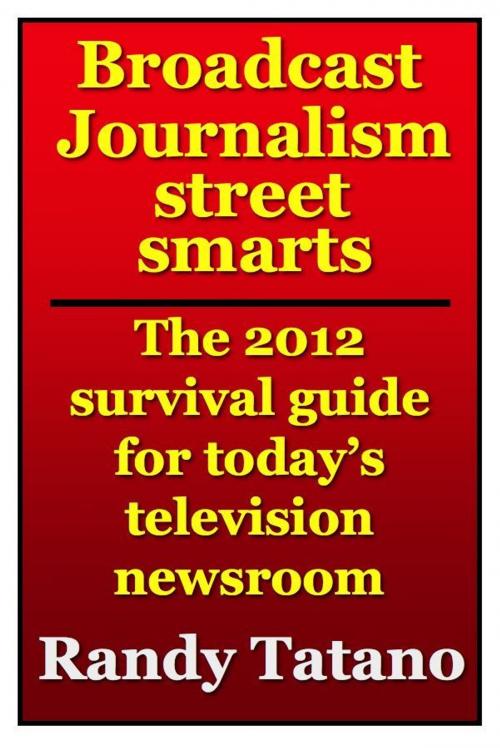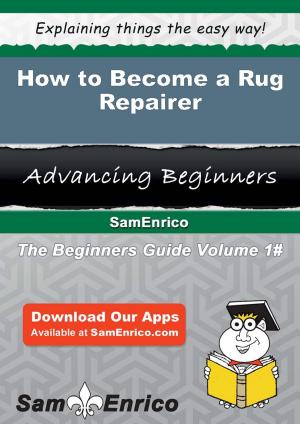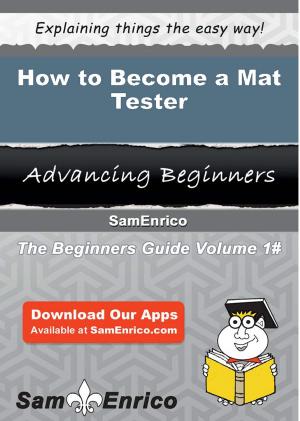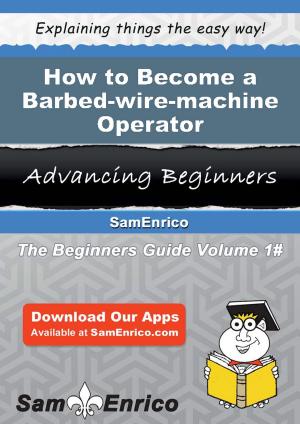Broadcast Journalism Street Smarts: The 2012 Survival Guide for Today's Television Newsroom
Nonfiction, Entertainment, Television, Performing Arts, Business & Finance, Career Planning & Job Hunting, Careers| Author: | Randy Tatano | ISBN: | 9781466174252 |
| Publisher: | RandyTatano | Publication: | January 8, 2012 |
| Imprint: | Smashwords Edition | Language: | English |
| Author: | Randy Tatano |
| ISBN: | 9781466174252 |
| Publisher: | RandyTatano |
| Publication: | January 8, 2012 |
| Imprint: | Smashwords Edition |
| Language: | English |
It's time for reporters to get street smart. And not just about reporting.
There's more to the television news business than gathering facts and getting your face on camera. You need to navigate the minefield present in every newsroom in America. Broadcast Journalism Street Smarts is a survival guide that offers tips to make your stories stand out, job hunting strategies and critical advice to help you navigate the unique office politics of broadcasting. And you'll get the News Director's playbook and learn about those "Jedi Mind Tricks" played on unsuspecting employees.
Learning how News Directors think, what they're looking for in a great resume tape, how to negotiate a contract, the ins and outs of out clauses, and mastering the intangibles of the business can be of great help in moving you up the ladder. In addition, you'll get some "street smart" tips on finding openings that aren't advertised and how to spot the red flags in a news operation before you take a job.
It's real world advice from a network broadcast journalist who's been on both sides of the fence as a reporter and a manager.
Chapter One
-Choosing a College
-The Intern's Guidebook
-The Almost Grad's Guide
Chapter Two
-Broadcasting Myths
-The Most Difficult Skill
Chapter Three: Television News Basics
-The Package
-How to cut time from your package
-Guide to B-roll
-An "ear" for natural sound
-The one-sided story
-Coming up with a standup
-Ending a package
-"Meeting" stories
-The viewer's point of view
-Architectural studies
-Before writing your package
-Reporter's checklist
-How to find a story
-Rounds calls
-The story "hook"
-Anchoring the first time
-Anchor checklist
-Successful anchors
-How to write a tease
-Backtiming your day
-How to produce a newscast and have time for lunch
-Interview Tips
-Political Interviews
-Reporter Involvement
-The lazy package
-The night shift
-Live shots made simple
-Sequences & jump cuts
Chapter Four: Job hunting
-Targeting a market
-Networking
-Do not call!
-Cover letters & writing
-What takes so long?
Chapter Five: Resume tapes
-How to send your tapes
-Need a tape? Rent a shooter
-Menus are for restaurants, not DVDs
-Emailing links
-Resume tape content: slates, montages, packages and anchoring
-Why you need enterprise stories on your tape
-Anchor tapes
-Tape order
-The back end of a resume tape
-Having two different tapes
Chapter Six: Job hunting
-Omerta
-What's wrong with my resume tape?
-The biggest resume tape mistakes
-Anchor tape mistakes: 27 dresses
-Big stories are not always resume tape stories
-Making the short list
-The follow-up tape
-Applying at the same station twice
-Sending tapes to consultants
-Agents
-Timing is everything
-Cleaning up your digital footprint
-Finding the openings
-Deciphering the job openings
-Hidden job openings
-A hybrid is a car, not a job
Chapter Seven: The market size myth
-Ratings and quality
-A foot in the door
-The News Director's point of view
-Road trips
-Feedback
Chapter Eight: Interviews
-Interview tips
-Out clauses
-Welcome to the dealership
-Interview questions
Chapter Nine: Office politics
-Jedi Mind Tricks
-Contracts: read the fine print
-Hidden career killers
Chapter Ten: Dealing with News Directors
Chapter Eleven: Intangibles
ABOUT THE AUTHOR
Randy Tatano spent more than a decade as a television news reporter and anchor and six years as a manager. His work has taken him from the floors of the Democratic and Republican National Conventions to Ground Zero in New York to Jay Leno's backyard. His stories have been seen on NBC, ABC and CNN, and he's been honored for his work by AP and UPI. He currently works as a freelance network field producer for NBC, CBS and ABC. He is also the co-author of a non-fiction book on the television industry, "Eyewitness Newsman" and has written two novels under his pen name, Nick Harlow.
He mentors young reporters through his website televisionnewscoach.com and writes an advice blog for television journalists, tvnewsgrapevine
It's time for reporters to get street smart. And not just about reporting.
There's more to the television news business than gathering facts and getting your face on camera. You need to navigate the minefield present in every newsroom in America. Broadcast Journalism Street Smarts is a survival guide that offers tips to make your stories stand out, job hunting strategies and critical advice to help you navigate the unique office politics of broadcasting. And you'll get the News Director's playbook and learn about those "Jedi Mind Tricks" played on unsuspecting employees.
Learning how News Directors think, what they're looking for in a great resume tape, how to negotiate a contract, the ins and outs of out clauses, and mastering the intangibles of the business can be of great help in moving you up the ladder. In addition, you'll get some "street smart" tips on finding openings that aren't advertised and how to spot the red flags in a news operation before you take a job.
It's real world advice from a network broadcast journalist who's been on both sides of the fence as a reporter and a manager.
Chapter One
-Choosing a College
-The Intern's Guidebook
-The Almost Grad's Guide
Chapter Two
-Broadcasting Myths
-The Most Difficult Skill
Chapter Three: Television News Basics
-The Package
-How to cut time from your package
-Guide to B-roll
-An "ear" for natural sound
-The one-sided story
-Coming up with a standup
-Ending a package
-"Meeting" stories
-The viewer's point of view
-Architectural studies
-Before writing your package
-Reporter's checklist
-How to find a story
-Rounds calls
-The story "hook"
-Anchoring the first time
-Anchor checklist
-Successful anchors
-How to write a tease
-Backtiming your day
-How to produce a newscast and have time for lunch
-Interview Tips
-Political Interviews
-Reporter Involvement
-The lazy package
-The night shift
-Live shots made simple
-Sequences & jump cuts
Chapter Four: Job hunting
-Targeting a market
-Networking
-Do not call!
-Cover letters & writing
-What takes so long?
Chapter Five: Resume tapes
-How to send your tapes
-Need a tape? Rent a shooter
-Menus are for restaurants, not DVDs
-Emailing links
-Resume tape content: slates, montages, packages and anchoring
-Why you need enterprise stories on your tape
-Anchor tapes
-Tape order
-The back end of a resume tape
-Having two different tapes
Chapter Six: Job hunting
-Omerta
-What's wrong with my resume tape?
-The biggest resume tape mistakes
-Anchor tape mistakes: 27 dresses
-Big stories are not always resume tape stories
-Making the short list
-The follow-up tape
-Applying at the same station twice
-Sending tapes to consultants
-Agents
-Timing is everything
-Cleaning up your digital footprint
-Finding the openings
-Deciphering the job openings
-Hidden job openings
-A hybrid is a car, not a job
Chapter Seven: The market size myth
-Ratings and quality
-A foot in the door
-The News Director's point of view
-Road trips
-Feedback
Chapter Eight: Interviews
-Interview tips
-Out clauses
-Welcome to the dealership
-Interview questions
Chapter Nine: Office politics
-Jedi Mind Tricks
-Contracts: read the fine print
-Hidden career killers
Chapter Ten: Dealing with News Directors
Chapter Eleven: Intangibles
ABOUT THE AUTHOR
Randy Tatano spent more than a decade as a television news reporter and anchor and six years as a manager. His work has taken him from the floors of the Democratic and Republican National Conventions to Ground Zero in New York to Jay Leno's backyard. His stories have been seen on NBC, ABC and CNN, and he's been honored for his work by AP and UPI. He currently works as a freelance network field producer for NBC, CBS and ABC. He is also the co-author of a non-fiction book on the television industry, "Eyewitness Newsman" and has written two novels under his pen name, Nick Harlow.
He mentors young reporters through his website televisionnewscoach.com and writes an advice blog for television journalists, tvnewsgrapevine















